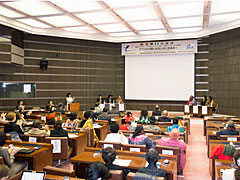
The panelists discuss their experiences building businesses as the audience listens.
Three African woman entrepreneurs told inspirational stories of overcoming challenges and building successful businesses at a panel discussion in Yokohama on Feb. 3.
Among the challenges they cited were a lack of access to financing, work-family balance, glass ceilings, male-dominated industries and gender discrimination.
JICA and the City of Yokohama co-hosted the event, entitled "Empowerment of Women Through Entrepreneurship,” to promote that goal and networking between the businesswomen of Africa and Japan. The discussion was part of a public symposium that day entitled “Growing Together with the Rising Women of Africa.”
The events took place at Yokohama Symposia. The panel discussion was held in Japanese and English with simultaneous interpretation, and approximately 300 people took part. Among them were woman entrepreneurs from Yokohama and the Tokyo metropolitan area and people representing Japanese companies with an interest in Africa.
The discussion featured African woman entrepreneurs Fikirte Addis Tedla of Ethiopia, Ellen Otaru Okoedion of Tanzania and Bongiwe Kali of South Africa. Each woman told her story.
Tedla of Ethiopia is a mother of two girls and the owner and designing manager of YEFIKIR, a fashion company headquartered in Addis Ababa that employs 10 people. She was a full-time psychologist dealing with children's social problems, including trafficking and abuse, before having a child and starting her own business.
Affected by the exploitation she had seen as a psychologist, she strove to create a company that had a “healthy relationship” with its employees and subcontractors. The latter are weavers, embroiderers and crochet-makers in specialized cooperatives. YEFIKIR uses Ethiopian hand-woven cotton to create child-labor-free products.
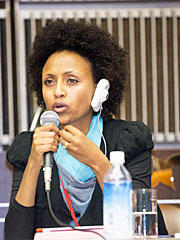
Fikirte Addis Tedla, owns YEFIKIR, a fashion company headquartered in Addis Ababa
Her company makes an effort to pay its subcontractors well and allow them to work from home, she said.
“What happens for women is when they go out of the house to work, if they don't have a sustainable, good environment for their kids, they come back and find their kids getting abused,” Tedla said.
“If I can create a whole-rounded system where I actually enrich myself with a beautiful Ethiopian culture using the unique products in Ethiopia and also produce in a very ethical manner, together I can create a better solution which is mainly sustainable, creating a healthy supply chain,” she said.
With four partners, Okoedion of Tanzania runs Lilac n Shades, a company in Dar es Salaam engaged in corporate public relations, brand development, documentary film production and event planning, and she mentors students and children on the side. She worked for many years in advertising and corporate communications, but left and started Lilac n Shades in 2009 because she wanted to spend more time with her two daughters.
She said she created documentaries that were televised and worked with journalists to publicize the issue of a lack of health care workers in rural areas.
"We have created a response from the government. Therefore we have seen that the health sector issues have been addressed. There are more health workers being deployed in the rural areas,” she said.
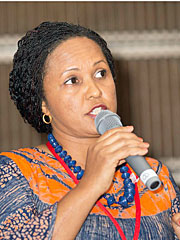
Ellen Otaru Okoedion runs the public relations company Lilac n Shades in Dar es Salaam with her partners.
Okoedion said finances were a challenge when she started her business and she had some studying to do.
This learning “allowed me to make money and invest the money back into my business rather than looking for investment from the outside. So that minimizes the chances of being financially restricted. Again, as a woman, and working in a very male-dominated industry, I found it very challenging to be able to penetrate into the industry,” she said.
Kali is an entrepreneur from a rural community in South Africa. She runs Kali Chicks and Poultry Farms, a poultry, equipment, vaccines and feed business. The family business was founded in 1998, and she took the helm in 2006. It hatches about 20,000 chicks weekly that it sells to small farmers. The company has 12 permanent employees. In 2008 she became the youngest person ever to win South Africa's Female Farmer of the Year award.
The industry was dominated by the white broiler chicken when Kali took over the company, and she determined that it was not well-suited for the African market. But in seeking an alternative, she was initially frustrated.
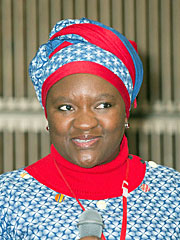
Bongiwe Kali leads her family's company, Kali Chicks and Poultry Farms.
“I looked into the South African Poultry Association for help. And I figured out that the association was very male-dominated and white-dominated. And therefore they form a glass ceiling within the industry and I couldn't penetrate it at all. They were not willing to help,” she said.
So Kali turned to the Internet and found a partner in India, who helped her find an indigenous chicken to raise instead.
“In order to bring growth and prosperity to our communities, we need to bring back what is known and what can be sustainable instead of bringing in new things that are not sustainable in our environment,” she said.
Kali said she centers her business and extensive civic activities on food security, poverty alleviation and economic sustainability.
A common meme at the event was that Africa is ascendant and its best days lie ahead.
As Tedla of Ethiopia said, “I know we can change the world, and I know Africa is becoming the best place now.”
Guest speakers at the panel discussion were Junko Watanabe, representative director of VM (Vitamin Mama) Inc., and Chinwe Ohajuruka, a Nigerian-born architect active in the United States.
The panel discussion was proceeded by a lineup of high-profile speakers. JICA President Akihiko Tanaka made opening remarks and Senior Vice-Minister for Foreign Affairs Nobuo Kishi gave a brief greeting. Then came keynote addresses by Yokohama Mayor Fumiko Hayashi and U.S. Ambassador to Japan Caroline Kennedy.
Hayashi talked about encountering various barriers in her own business experiences before launching initiatives as mayor to fulfill her public promise to make Yokohama "the city in Japan where it is easiest for women to work."
Kennedy said Japan and the United States are working together toward women's empowerment to contribute to global economic development.
"I hope this symposium will be an opportunity for Japan and Africa to exchange ideas and learn from each other," Tanaka said.
"I want to continue examining what kind of partnership is possible between Japan and the U.S. to support African women," said Kishi.
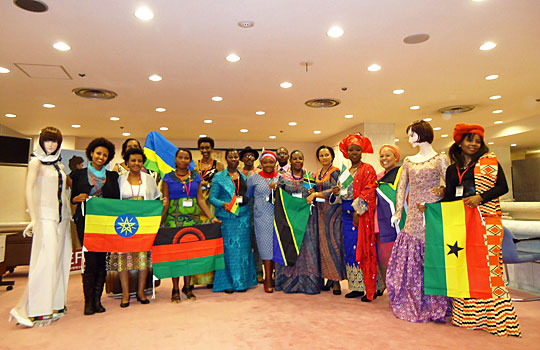
One businesswoman and one government official from seven African Countries (Ethiopia, Ghana, Malawi, Nigeria, Rwanda, South Africa and Tanzania) participated in the seminar.
The symposium was part of a larger program, the Africa Women's Business Development Seminar, held from Jan. 26 to Feb. 6. It was a follow-up event to the Fifth Tokyo International Conference on African Development (TICAD V), held in June 2013. At TICAD V, an agreement was made to launch the Japan-Africa Business Women Exchange Program for the purpose of strengthening the capacity of women's leadership in Africa. The events Feb. 3. were a first step in that program.
As part of the Japan-Africa Business Women Exchange Program, JICA plans to continue inviting African women entrepreneurs and government officials who support women's businesses to Japan every year. JICA will continue enriching the program so it will be useful in building the network between African and Japanese women entrepreneurs and expanding businesses.




scroll